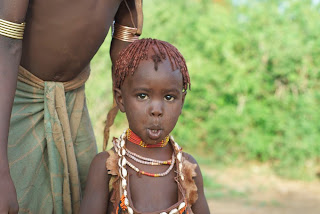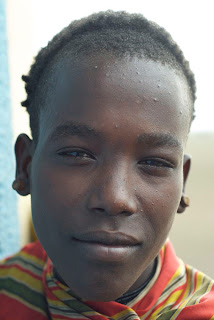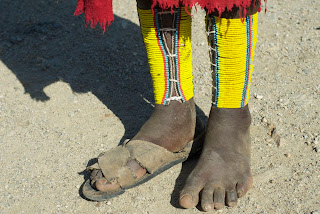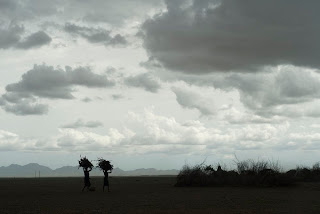1 month later we entered a town north of Butajira, some 100 km south of Addis Abeba: at first the price of the hotel room was to be 150 Birr. Then, after asking the young boy who first helped us, we realized that the price was "only" 100 Birr. When it came to dinner, the young man calculated the meal price for us, but when he came back with the bill, it had gone: the lady running the hotel had just decided to add about 50%! The next morning we ordered two coffees just to realize when paying that the farenji price for coffee had increased of 66%! When confronting the owner with our facts he would try to convince us that these were Habasha prices (Ethiopian prices). And he would pretend to get angry to make us feel bad!
We slept in a place called Mirab Abaya in a cheap hotel with a beautiful courtyard. Leaving in the morning the owner opens the gate and asks me, while I push out the bicycle, "Give me money"!!!!!! As if one could just ask a client who leaves after having paid to give him money! What is in the heads of Ethiopians???
Sometimes when asking at the reception if the price given to us is a farenji price, the answer is no. "So there is no difference in price between farenji and Ethiopians?" No, is the answer. Cross checking we find out that our Ethiopian neighbour pays less than us. So there IS A FARENJI PRICE! And yes, that was a double lie! in our face! straight!
We slept in a place called Mirab Abaya in a cheap hotel with a beautiful courtyard. Leaving in the morning the owner opens the gate and asks me, while I push out the bicycle, "Give me money"!!!!!! As if one could just ask a client who leaves after having paid to give him money! What is in the heads of Ethiopians???
Sometimes when asking at the reception if the price given to us is a farenji price, the answer is no. "So there is no difference in price between farenji and Ethiopians?" No, is the answer. Cross checking we find out that our Ethiopian neighbour pays less than us. So there IS A FARENJI PRICE! And yes, that was a double lie! in our face! straight!
The prices in Ethiopia are not high. The question is not about the amount one pays but more a philosophical one: does one pay for a service or does one pay a price because his/her skin is white and not brown?
We have had our thinking and problems with this in Jordan, Egypt (not in Sudan!) and now again in Ethiopia. What people here don't seem to realize is that if the service is good and the price is cheap we will tip a lot, be happy, come back and make publicity for their hotel, restaurant or what it may be. On the contrary, if we feel cheated we will not tip and, worse, we will not talk well about the place we have been.
Or in other words: the white walking wallet, if not treated fairly, will not be lucrative in the long run!
When cycling in the country side, one has a lot of time to see the country and listen to the thousands of "Fareeeeeeenjiiiiiii!", "Money" and "Fuck you!" one is being shouted at. What strikes us is not so much the fact that these words are repeated over and over (which makes the day very very tiring!) but more so that if not giving money, it seems appropriate to throw stones or shout "fuck you!" or "motherfucker". Sometimes adults do intervene but many time adults are around and don't say anything or even smile or even yell themselves. Just to make things clear: most of the time it's kids asking for money, pens or clothes. But many times it's also adults and elder teenagers asking us to contribute to their well-being.
There seems to be a general assumption that the farenji coming on his bicycle is here to distribute money, pens, clothes or other items.
Meeting the above mentioned mindsets once a day is saddening, having to deal with it every minute is just ANNOYING! Worse: it does not stop throughout the day! It starts when leaving the hotel compound and ends when re-entering the new hotel compound! We start to understand why farenjis need some "safe" place to hide away! It's sad but understandable. We would love not to feel like that, but so far our experience has taught us exactly that! And because every Ethiopian wants something from us, we don't want to meet new people! This is horrible for traveling in a country by bicycle! It's like ignoring the people and trying just to enjoy the landscape when no "Farenjiiiiiii" is reaching your ears!!!
Meeting the above mentioned mindsets once a day is saddening, having to deal with it every minute is just ANNOYING! Worse: it does not stop throughout the day! It starts when leaving the hotel compound and ends when re-entering the new hotel compound! We start to understand why farenjis need some "safe" place to hide away! It's sad but understandable. We would love not to feel like that, but so far our experience has taught us exactly that! And because every Ethiopian wants something from us, we don't want to meet new people! This is horrible for traveling in a country by bicycle! It's like ignoring the people and trying just to enjoy the landscape when no "Farenjiiiiiii" is reaching your ears!!!
One day, we pass a village and some girls run after us. As I turn around I see one of them throwing a stone that first hits the ground then the trailer. This time is too much! We already had some stone throwing kids that day and I just had enough! I stop the bicycle, throw it to the ground in the middle of the street and run after the girl who has thrown the stone! I catch her after maybe 100 m and shake her. She screams and is scared to hell. Immediately adults gather and come up with the usual "she is just a kid" stuff. I let go and walk away. Arriving back at the bicycle there is a crowd and the English teacher with whom we discuss the matter. In the end he apologizes, I shake hands with the girl (on my demand!) and we leave. it's just been one time too much! We don't think that any kid in this village is soon going to throw stones at farenji again!
Leaving Ethiopia through the southwest we stay overnight in Omorate, our last village in Ethiopia. The price for Injera is double as is the price for softdrinks!
When cycling through the No-Man's-Land between Ethiopia and Kenya, we loose our way and end up asking in a village. The kids show us the way to the road (about 200m!) and of course want something for their service. We don't want to give. And it ends as one of the less nice encounters in Ethiopia: the kids steal Yann's Nalgene bottle and a jar of Nutella and one of Peanut Butter! What a "lovely" Ethiopian farewell! ;-((
All these encounters happened to us while cycling in Ethiopia. We can't talk about how it is if someone is traveling by car or public transport. But one thing is for sure: we do strongly advise against cycling in Ethiopia!
Sorry to the few nice and friendly Ethiopians we met, but THIS was our main experience!
Sorry to the few nice and friendly Ethiopians we met, but THIS was our main experience!































































































